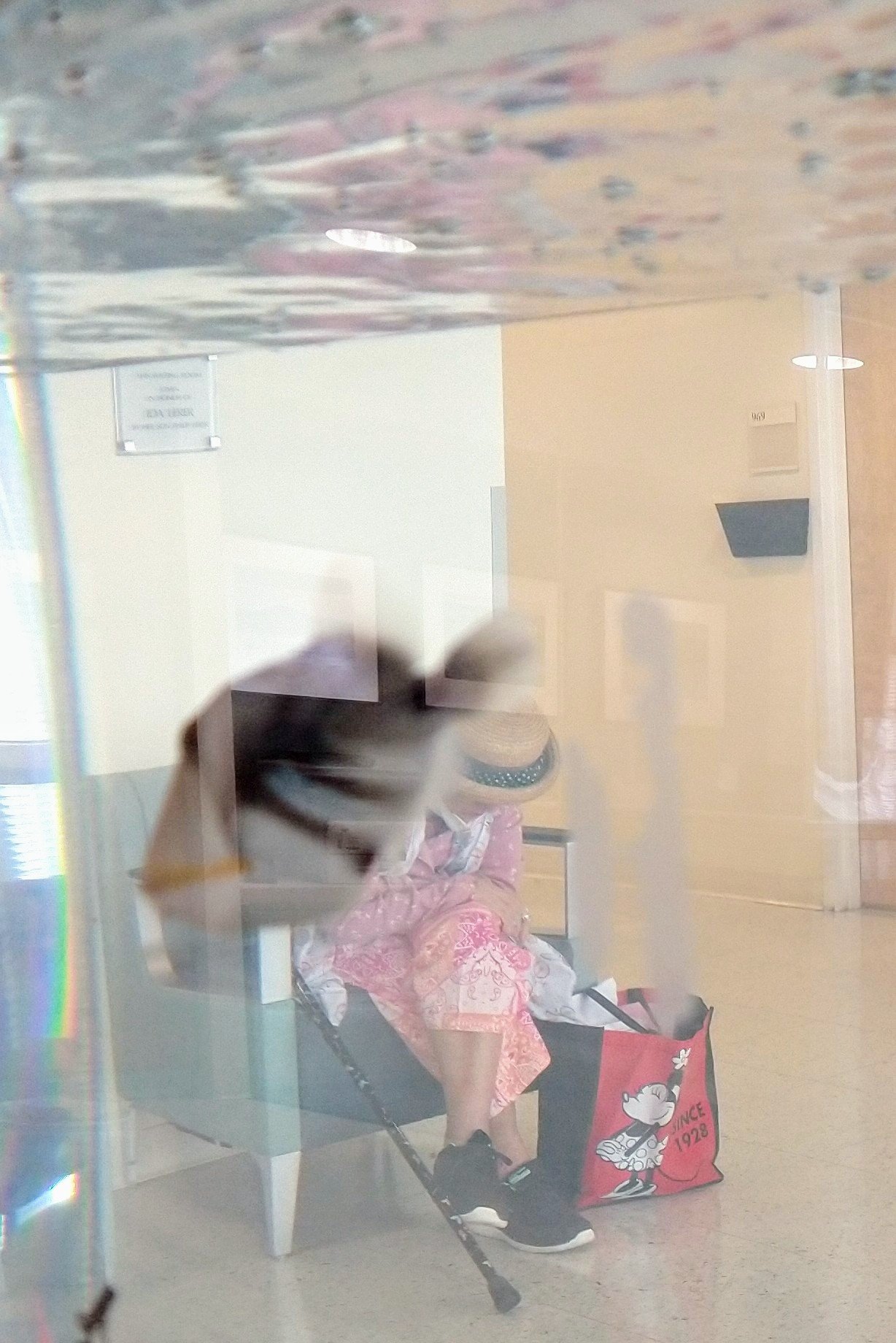Kristin Graziano’s “Contents Have Shifted” considers how best to respond to a parent’s dementia-inflected reality. “For years,” Graziano observes about her mother, “I felt compelled to refute her falsehoods. I felt that by correcting her, I could yank her back to The Truth, to the real world. When I did this, sharp words with resentful tones followed, leaving us both frustrated and silent.”
Read moreOur Body is an Ecosystem: A reflection by Jeanne Yu
I came across two Intima pieces in conversation with my recently published poem, “Mercury, A Public Service Announcement” When I was younger, I took my body for granted. I thought medical science or pharmaceuticals would patch all my future ills. Wanting to live life to the fullest made it difficult in my busy life to do more than what was needed at that moment and then move on ... but as I age, I find my body has kept score and is less resilient.
Read moreWe Wait….a reflection by writer Nancy Lewis
During my many years with chronic illnesses, I’ve spent far more time waiting for healthcare than actually receiving it. It’s always nerve-wracking. I never know how long I’ll be hanging around; it could be anywhere from minutes to hours. I fret over whether to go to the bathroom before or after an appointment, afraid I’ll miss my turn if I’m not there when they call me in. And of course, I worry about what I’ll hear when I finally get attended to; I’ve received lots of bad news over the years.
Read morePoetry and Palliative Care, a reflection by writer Dan Yashinsky
I’m writing in response to Danielle Snyderman’s Field Notes essay “Not Yet, The Epilogue” (Spring 2021 Intima). I wrote the poem “The Trail to Ahous Bay” to read aloud to my friend Joan Bodger. She was in the palliative care unit of Tofino Hospital on Vancouver Island. I had come from Toronto to visit with her, and to say goodbye. I was staying on Vargas Island, a short boat ride from Tofino, and had taken the cross-island hike that became the poem.
Read moreMoving into Compassion, One Small Moment at a Time by anesthesiologist Molly McCormick
I think about time a lot now. My days are ruled by schedules and cases and meetings, and I spend much of my day reacting to the pressures of the unrelenting sweep of the second hand as it moves around turning into minutes and hours, never slow enough for me to accomplish everything I need to do.
Read moreIt’s Happening to Me, Too: Reflections on Interconnectedness, Interdependence, and Independence in Caregiving Relationships by Leena Ambady
“Every thought begins with I. This is happening to him, I try to say,
not happening to me. But it is, too. This is my place to tell it.”
The above is an excerpt from Kristin Camitta Zimet’s “A Dialysis Diary,” (Intima, Fall 2023). In this beautiful essay, Camitta Zimet writes about her husband’s end-stage kidney disease, the initiation of dialysis, and the impact that his chronic condition and the treatment it required had both on her and her relationship.
Read moreCaring and the Challenges of Social Convention, by Jeffrey Millstein, MD
An internist reflects on his short story as well as a fellow physician’s personal essay and explores the complex issue of crossing implicit social boundaries in the clinician-patient relationship.
Read moreWe’re Invisible, Too: Showing Respect for Healthcare Workers by Cheryl Bailey
A retired gynecologic oncologist reflects on her own career and realizes how watercolor artwork can allow for even healthcare providers to be seen.
Read moreWisdom of the Ages: A Surgeon's Reflections on Writing, Vocation and Satisfying Endings
As I was creating Hal Winters, the character at the center of my short story, “Old Scrubs,” (Spring 2024 Intima) I imagined a rumpled, gray-haired, and unflappable older male surgeon who has seen it all. He heads to the hospital every day, goes through the motions and gets his work done without fanfare or fireworks. He hasn’t felt the spark of “why” he went into medicine for years but, as long as he remembers the “how,” he will keep plowing the same furrow.
Read moreBefore and After: In Response to “The Face as an Organ of Identity” by California community doctor Katie Taylor
I work at a community clinic with patients who are homeless–there is the stigma of homelessness, and then there is the stigma of looking homeless.
Some patients of mine do not–or do not yet– appear unhoused. It is usually those who still have family that support them, who live in a car, who hold a job—running food for Doordash, picking for Amazon, sitting security—or who have not been homeless for so very long. But many of my patients do appear frankly homeless: a shuffling gait, a blanket draped around their shoulders, belongings pushed in a stroller, blackened teeth, leg wounds.
Leaning Close: "No more interventions. No more transfusions." A reflection on mortality and morbidity rounds by pediatrician-writer Laura Johnsrude
When I read “All Tuned Up” by Albert Howard Carter III (Spring 2021 Intima), I remembered a pediatric intensive care unit patient from my own 1980’s residency experience. In Carter’s poem, a medical resident presents a case during mortality and morbidity rounds. The resident is moved to tears as he tells the gathered audience about the death of a patient he knew well. A senior doctor “gently” offers context and says, “Maybe he was just tired.”
Mercifully, I’ve muffled memories from some of the deaths during my residency training in the pediatric intensive care unit. But I remember a slight girl of about sixteen with silky, wavy hair, lying in a metal-frame bed parallel to the wall against the window, in silhouette.
Read moreThe Healing Power of Empathy: Does it Exist? Can it be Acquired?
In this reflection, a retired surgeon examines the research findings of evidence-based medicine to uncover whether empathy, in addition to the principles and practice of narrative medicine, can facilitate deeper healing.
Read moreFear and Compassion: At the Heart of Panic Attacks by Lisa H.D. Napolitan
© How a Heart Grows. Susan Baller-Shepard. Fall 2018 Intima
Fiction and visual art are a natural pairing, one digging deep through words, the other a profound visual exploration. Both genres allow ways to explore the issue of mental health.
Read moreHow to Write About Cancer: How Poetry Can Break the Rules by writer Lynne Byler
Recently, I read Adam Conner’s short story “How to Write about Your Cancer” (Fall 2022 Intima) with amusement and recognition. And if I transform the rules in it to a scorecard, my poem, “Minds Go Where Bodies Can't” ends in the red.
Read moreListening to Beethoven: A Reflection on Professional Responsibility and Personal Recognition by poet Susan Carlson
“I like Beethoven the best!” is a declaration made by a patient of Mitali Chaudhary, as she readies to leave his hospital room. A busy senior medical resident at the University of Toronto, Chaudhary juggles many demanding responsibilities with her desire to get to know this elderly patient. In her Field Notes essay titled “Beethoven’s Symphony No. 5,” published in Intima’s Fall 2023 issue, she recalls how she’d tried to get her patient to respond to questions about symptomatology, all the while aware that twenty-three other patients – along with a group of junior residents and medical students – were awaiting her time and attention. In that moment, she finds herself turning away from an opportunity for a personal interaction with him in order to ensure she manages her tasks appropriately.
Read moreDementia and Alzheimer’s Disease: When the Outside Looks Different From What’s Happening Inside by Kimberly Mitchell
© The War Outside. From “The Impact of War on Mental Health” series. Claire Lawrence Spring 2022 Intima
One of my most enduring memories of volunteering is of helping with a beauty club for patients with advanced Alzheimer’s Disease. Each week I would be regaled with stories of young women visiting their mothers and planning fun outings with their girlfriends. While I applied makeup and painted fingernails, the smiles and facial expressions were those of young women anticipating a good time.
On the outside these ladies were quite different.
Endurance and Gratitude: A reflection on finding joy in difficult moments by Laura Carmen Arena
Both Karen George’s poem, and my “Triptych:Oncology Fish,” share an expression of admiration for the resplendent inner strength in our loved ones, emanating despite the foreboding shadows of illness, suffering and loss. The emotions floating around our lived spaces as our loved ones endure and battle disease in the face of difficult circumstances move in many directions including grieving, reflecting, hoping, enduring and celebrating, colors that shift and radiate with the heroically hopeful, illuminating presence of gratitude and love.
Read more"Reading" Patients When Illiteracy is What Afflicts Them: A reflection by medical oncologist Jose Bufill
While returning to the U.S. on an international flight not long ago, I sat next to a young African woman. As we approached our destination, she sheepishly passed me her passport and a customs form. Since I was in the aisle seat, I assumed she wanted me to pass it along to the flight attendant, until I realized the form was blank. She was asking me to fill it out.
Read moreWhat Great Literature Taught Me by internal medicine resident Teva Brender
Great books can guide us in every day life, and I found it fitting that Dean Schillinger, MD and I both invoke works of literature to describe the experience of realigning our values with those of our patients. In his essay, “The Quixotic Pursuit of Quality,” (Spring 2015 Intima) Dr. Schillinger compares himself and his patient, Mr. Q, to Quixote and Sancho Panzo from Miguel de Cervantes Saavedra’s Don Quixote. With only misplaced medication lists, no-show appointments, and a stubbornly elevated hemoglobin A1c to show for his repeated efforts to help Mr. Q better manage his many comorbidities, Dr. Schillinger’s frustration melts away when Mr. Q unexpectedly gives him a massage. From then on, “the duel was over.” There would be no more tilting at windmills.
Read moreThe Thing About ‘Good News’ at the Doctor’s Office by neuropsychology postdoc fellow Sarajane Rodgers
In theory, whenever we go to the doctor, most of us want to hear “good news.” The test is negative. You don’t have ___. Your results are inconsistent with ___. There are times where we take that in and walk away with an emotional weight removed. Other times, we are left with a void. The diagnosis we thought we could hang a hat on is taken away. Now where do we put our hat?
Read more


